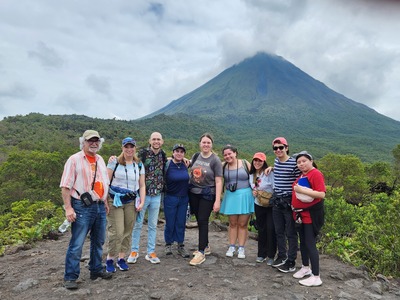 Menu
Menu

"That’s not something you can capture with a camera."
IRVING, Texas (March 30, 2023) — After a week of studying in Costa Rica, politics major Patricio Rodriguez remembers watching a school of fish swell and shrink with the waves in a manner that reminded him of respiration, the pulse of the great lungs of the sea. He remembers the flowers that hang heavy in the cloud forest of Monteverde. But he especially cherishes a sight that cannot be photographed: the afterimage of a crater pool, lingering blue and spectral in his eye over the peak of the Volcán Poás.
“I was talking with Dr. Scott Churchill. We were looking into the crater lake, and as we were walking back from it, he said, ‘Do you see an afterimage?’ And I asked him, ‘What do you mean?’ He said, ‘You were staring at the pond for so long. Do you see this little blue thing in your vision?’ And I close my eyes,” Rodriguez recalls.
“I remember seeing the blue, the blue pond oval. And I look up. … I remember seeing the clouds kind of come in, and you could see the mist move, and everyone was taking photos of that. And I thought, no, that’s not something you can capture with a camera. That’s the afterimage. You look at the clouds and you can still see that little blue pool there.”
Rodriguez was one of seven students that accompanied biology professor Deanna Soper, Ph.D., and psychology professor Scott Churchill, Ph.D., on a trip to study ecology and ecopsychology in Costa Rica.
As part of UD’s Core Curriculum, every undergraduate student must complete a lab course in biology. These lab courses normally take a few hours every week for a semester. The Costa Rica trip packs the same amount of lab time into a week of immersive learning.
While in the country, students visited multiple ecosystems, including the cloud forest in Monteverde, the intertidal and near offshore marine ecosystems near Quepos, the Arenal volcano, and the Poas Volcano, which is home to the world’s second-largest crater. Students observed a diversity of plants and animals, attended lectures in the field and participated in class discussions to reflect on their experiences.
Soper and Churchill habitually take class out of the classroom. Soper takes students to Florida every other year to study corals and retrieve samples, and Churchill regularly visits the zoo with psychology students to see apes’ ability to communicate.
As Soper puts it, “Obviously my first home has to be walking around in the terrestrial environment. My second home is the ocean, and my third home is on the back of a horse.”
Along with the tropical jungle, Soper’s research trips have taken students into national laboratories, sea turtle hospitals and the ocean.
“I take them snorkeling or scuba diving, if they can dive,” Soper says. “If they’re a snorkeler, they can watch from top. And then I also take them to research facilities.”
Of course, both professors do valuable work from the Irving campus as well. Soper and her students examine coral samples with UD’s electron microscope to aid the coral regrowth efforts of famed marine biologist David Vaughan, who joined forces with Soper shortly after discovering by accident a method of coral-tending that can save endangered reefs. Churchill, a fellow of the American Psychology Association (APA), has published psychological exercises for students that he developed over his decades of classroom experience.
And yet, between teaching, grading, research and publishing, Soper and Churchill find something very important waiting in the forests of Costa Rica.
Junior biology major Monique Bedolla, one of the students that went on the Costa Rica trip, has worked as a research assistant in Soper’s lab since her freshman year. She called the excursion “magical.”
“Just magical. I think that’s the best way to describe things,” Bedolla said.
“I never thought that I’d be that affected by being in nature. I just don’t know how to describe it. It was just so magical. And I’ve been talking to my fellow students that went on the trip, and they also feel so affected by the trip. It makes us think about nature in a completely different way.”
Rodriguez and Bedolla both say the trip changed the way they see the world. Most of the students and both professors have returned to microscopes and desks; even so, the trip leaves a faint but irreproducible image lingering in their eyes.
“It’s a very important class to take because it makes you think about the way we live,” Rodriguez said.
“It helps reshape your view of the earth as a human, your connection to other humans, your connections to animals, and the grass, and the earth.”
About the University of Dallas
The University of Dallas is the premier Catholic liberal arts university in the country, nationally known for its undergraduate Core Curriculum. With campuses in Texas and Italy, UD is committed to the pursuit of wisdom, truth and virtue as the proper ends of education. For more information, visit udallas.edu.